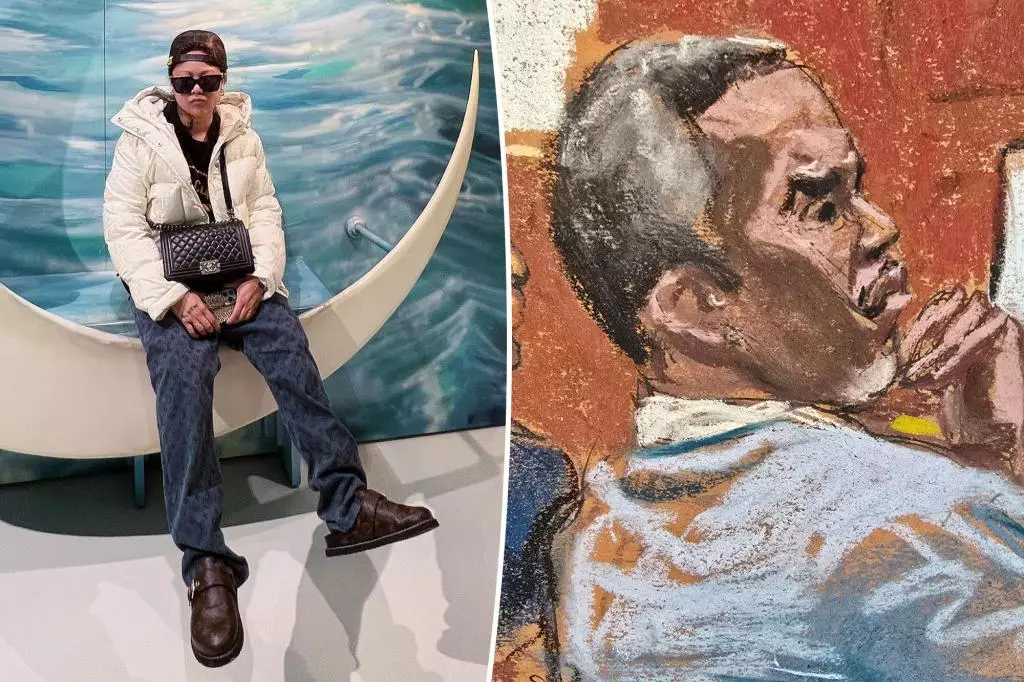In a startling turn of events, the music and fashion worlds are being rocked by severe allegations against Sean “Diddy” Combs, brought to light by fashion designer Bryana “Bana” Bongolan. In a Manhattan federal court, Bongolan claimed that in a distressing encounter in September 2016, Diddy subjected her to a horrific act by allegedly dangling her off the balcony of his ex-girlfriend Cassie Ventura’s high-rise condo. This alarming testimony has not only tarnished Diddy’s public image but has also raised critical questions about a culture within parts of the entertainment industry that may condone or overlook such troubling behaviors.
Bongolan recounted her traumatic experience, describing how Combs, a towering figure in hip-hop, allegedly lifted her, only to affix her precariously over the edge of the railing. “He basically came up from behind me,” she recounted, demonstrating the raw fear she felt at that moment. The implications of such actions are profoundly disturbing, illustrating how power dynamics can create environments where intimidation and threat flourish, overshadowing personal safety and dignity.
The Aftermath: Psychological Scars and Ongoing Battle
The emotional repercussions of this alleged incident have extended far beyond the courtroom for Bongolan. Her claims of experiencing “night terrors” and “paranoia” reflect a reality faced by many survivors of abuse, wherein the psychological scars can linger long after the physical wounds heal. Testifying about her state of mind, she expressed that the lasting impacts of Diddy’s alleged wrath are not something she easily escapes.
Echoing her sentiments, other witnesses have emerged, painting a broader picture of Diddy’s alleged volatile behavior. Ventura, who has bravely testified about her own encounters with Diddy’s aggression, has added weight to Bongolan’s accusations. Ventura’s accounts of physical abuse from Diddy reveal troubling patterns of behavior that raise questions about the safety and treatment of individuals around powerful figures.
Legal Ramifications and the Fight for Justice
Bongolan’s decision to bring forth a civil lawsuit against Diddy for sexual battery and false imprisonment, seeking a staggering $10 million in damages, reflects a growing awareness and resistance to abuse within the entertainment industry. Her declaration that she seeks justice for the ordeal she endured expresses a vital ethos: victims can no longer remain silent or normalized in their suffering. She has stepped into the spotlight not only to confront her alleged abuser but to advocate for other victims who may have felt powerless.
In a striking juxtaposition, Diddy’s legal team has vehemently denied the allegations, asserting their confidence that the claims will eventually be dismissed as unfounded. Such responses are common in cases of accusations against high-profile individuals, often seeking to deflect attention from the very serious nature of the claims. The ongoing court debates are a microcosm of broader societal issues concerning accountability, the power balance within the industry, and the pressing need for change.
Witnesses Speak Up: A Culture of Fear?
Other testimonies in the court have further highlighted a troubling culture that seems to cling to fear and intimidation. A former assistant, Capricorn Clark, echoed Bongolan’s allegations when she claimed that Diddy threatened her life over her connections to his rival, Suge Knight. Such repeated instances of alleged aggression underscore a pattern that cannot be overlooked and raises critical discussions about workplace safety in industries historically dominated by powerful men.
This barrage of allegations against a figure as prominent as Diddy forces society to confront uncomfortable truths about celebrity culture, power dynamics, and how often these environments may foster abusive behavior. Each testimony adds a layer to the chilling narrative that may ultimately lead to a reckoning, not just for Diddy but for many who operate within a structure that has allowed these patterns to persist unchecked.
In a world where justice often seems elusive to the underrepresented, the courage shown by individuals like Bongolan—who confront their abusers and seek recognition for their suffering—becomes integral. As more voices raise against potential malpractice and violence cloaked beneath glamour and fame, the hope remains that perhaps, this moment can become a catalyst for genuine change in the industry that has for too long remained shrouded in shadows.

